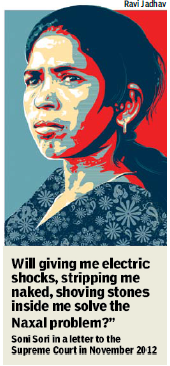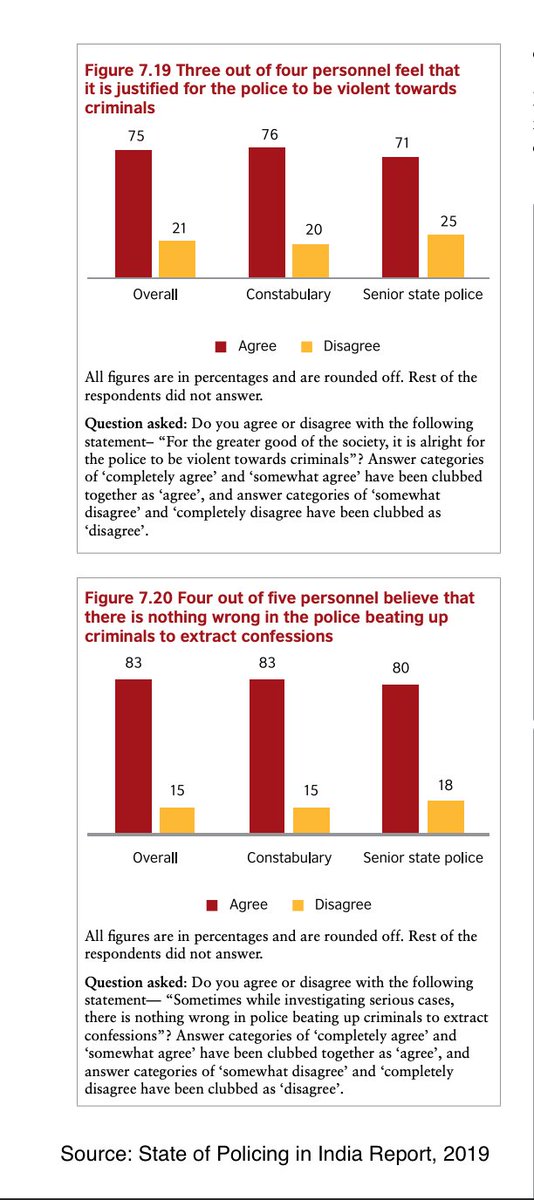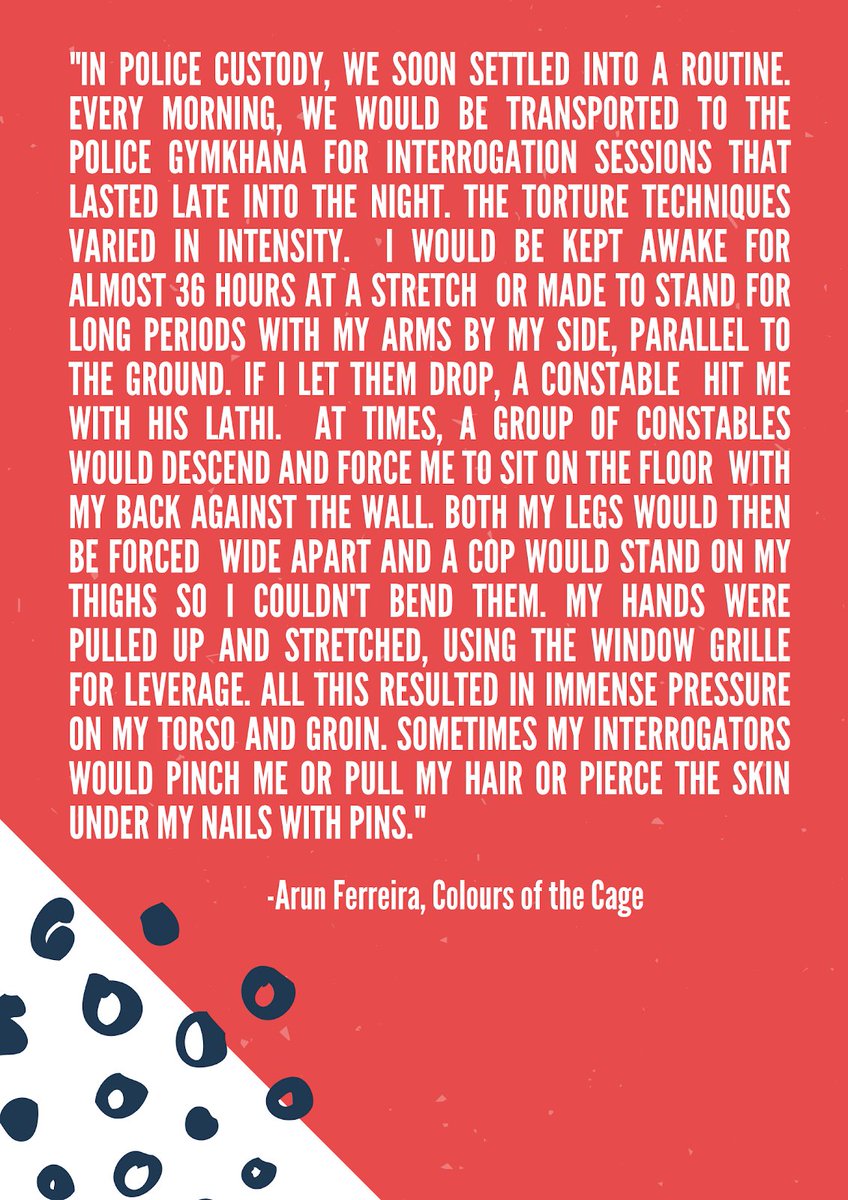Helle, we are @aimanjkhan & @GuneetKaurAhuja. On Friday, we discussed how UAPA& #39;s wide powers to discriminatory governments & investigating agencies are arbitrarily used to target minorities, marginalized & HRDs. 1/n https://twitter.com/detsolnet/status/1273985094328266752">https://twitter.com/detsolnet...
Today, we will elaborate on how a UAPA accused is denied his/her/their right to life & liberty, as well as the right to a free & fair trial. The pre-trial & trial processes are designed to punish an accused person. 2/n
Somebody does not become guilty of a crime simply because the state has accused him/her/them of the crime. We have constitutional commitments that protect the life & liberty of an accused person. The rights are also, laid out in the criminal procedure code (Cr.P.C.). 3/n
UAPA provides an exception to these Cr.P.C. procedural safeguards. Beyond the legal dilution of procedural safeguards, judges tend to look the other way, w.r.t even the limited safeguards that a UAPA accused has & often endorse prosecution will when it comes to grey areas.4/n
Art. 22(2) of the Constitution requires that an arrested person is produced before the magistrate within 24 hours. However, police often keep accused in illegal custody for days & HCs tend to accept the police& #39;s claimed date of arrest if habeas petitions are filed.5/n
On production before a magistrate, he is supposed to check for any custodial torture & take steps in case of police brutality. But in UAPA cases, even in cases of visible injuries, magistrates will take the police’s word for it. 6/n
Soni Sori, an Adivasi human rights defender, is implicated in several fabricated UAPA cases. When she was produced before the magistrate, she was too weak to walk because of brutal police torture & lay supine on the floor of the police van in which she was taken to court.7/n
Instead of checking Soni& #39;s condition herself, the magistrate bought the police version that Soni hurt herself in a fall in the bathroom & sent a court clerk to record Soni& #39;s statement. On an SC ordered independent examination in Kolkata, her sexual torture was established.8/n
Under ordinary law, an accused can be sent to police custody (PCR) for up to 15 days. Under UAPA, PCR can be extended for up to 30 days. PCR in India is synonymous with custodial torture. Police often subject the accused to violent & brutal methods to extract confessions. 9/n
Torture in custody is illegal in India but widely practiced by a brute police force, often acquiesced to by a compliant judiciary & celebrated by our society & pop culture. 10/n
Extended police custody, gives extended time to the police to torture the accused. Trial courts often relaxed towards the legal requirements of mandatory medical check-ups. 11/n
Surjeet Singh Phool, a popular agrarian leader in Punjab was implicated in a UAPA case. The magistrates ignored his right to legal representation, extended his police custody without medical check-ups. 12/n https://www.youtube.com/watch?v=eOsxakMsLSM&t=436s">https://www.youtube.com/watch...
Bail is generally a matter of right under criminal law as long as there is the surety that the accused will appear before the court for the trial & does not try to hamper the investigation. UAPA provisions are structured in a way to eliminate an accused& #39;s right to bail. 13/n
An accused cannot apply for anticipatory (before arrest) bail if charged with a UAPA offense. Anticipatory bail, a recourse available under Cr.P.C. is not available to those accused with UAPA offenses. 14/n https://www.indiatoday.in/india/story/bhima-koregaon-case-sc-refuses-anticipatory-bail-navlakha-teltumbde-1656176-2020-03-16">https://www.indiatoday.in/india/sto...
Usually, police have 90 days to file a charge-sheet, which basically lays out the case against an accused, the crimes he/she/they are charged with & prosecution evidence to support the same. This requirement is relaxed to 180 days for UAPA cases. 15/n
For an IPC offense, if police fail to file a charge sheet in 90 days, the accused gets statutory bail by default. Davinder Singh was caught doing a terrorist act, but he was charged under IPC, not UAPA. No charge sheet in 90 days, he got bail. 16/n https://www.indiatoday.in/india/story/davinder-singh-bail-terror-case-jammu-and-kashmir-1690700-2020-06-19#:~:text=Suspended%20Jammu%20and%20Kashmir%20DSP,arrested%20in%20January%20this%20year">https://www.indiatoday.in/india/sto...
Compare this to Adv. Gadling, now in custody for over 750 days since the police implicated him in a UAPA case. NIA took over after the police filed a chargesheet & are virtually re-investigating the case while he & other activist languish in jail. 17/n https://thewire.in/rights/elgar-parishad-devendra-fadnavis-surendra-gadling-sudhir-dhawale">https://thewire.in/rights/el...
A UAPA accused can be detained for 6 months without any requirement on the police to share the charges against him/her/them or produce any evidence against the accused justifying such custody. 18/n
Strict procedural requirements of a prosecution report to show progress in investigation & reasons for continued custody have also been watered down by the SC now. 19/n https://indiankanoon.org/doc/62051771/ ">https://indiankanoon.org/doc/62051...
Then there is the repression of clause 43D(5) of UAPA, that restricts the courts from giving bail if the case diary or charge-sheet shows that there is reasonable ground to believe that accusations against such person are prima-facie true. 20/n
As @gautambhatia88 notes, the case diary/charge sheet is the police version. It doesn& #39;t matter if such a version & supporting evidence ultimately do not survive judicial scrutiny. The state& #39;s story is enough to silence and persecute innocents.21/n https://www.thehindu.com/opinion/lead/bhima-koregaon-and-the-fault-in-our-laws/article24305910.ece+&cd=2&hl=en&ct=clnk&gl=in">https://www.thehindu.com/opinion/l...
Further, the language of the section is such that it requires courts to make a judgment before the trial is over. Judicial convention restricts judges from making such observations before the trial is over. Therefore, courts are hesitant even if there is no prima facie case. 22/n
See @nitikakhaitan & #39; s article that explains the above-mentioned point. So essentially, the state arbitrarily used its wide power to target marginalized groups & HRDs under a law, which is designed to punish the accused before the trial is over. 22/n https://indconlawphil.wordpress.com/2020/06/15/guest-post-silence-and-pragmatism-skirting-bail-conditions-in-the-uapa/">https://indconlawphil.wordpress.com/2020/06/1...
One would hope that such a law will be strictly used against only those w.r.t whom the state has a strong case. However, that is not how it is. In the thread that follows,
@mrinpinshar from @AIIndia share the statistics regarding UAPA cases, which proves the contrary. 23/23
@mrinpinshar from @AIIndia share the statistics regarding UAPA cases, which proves the contrary. 23/23

 Read on Twitter
Read on Twitter






